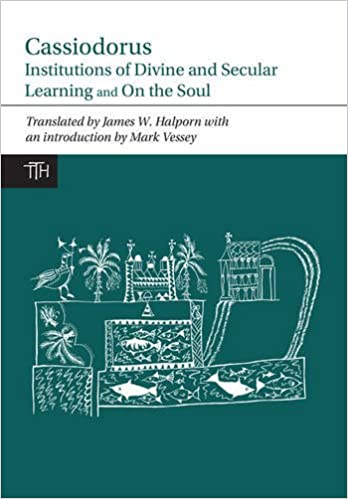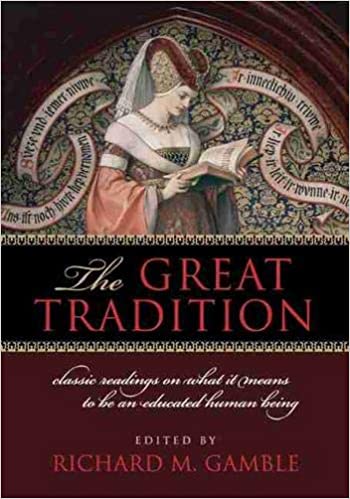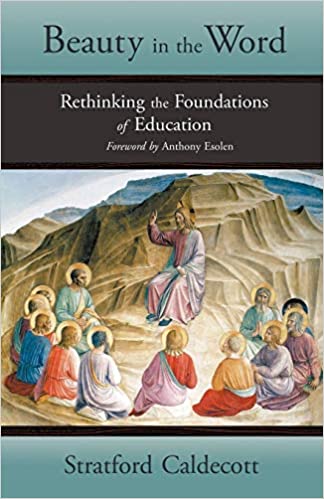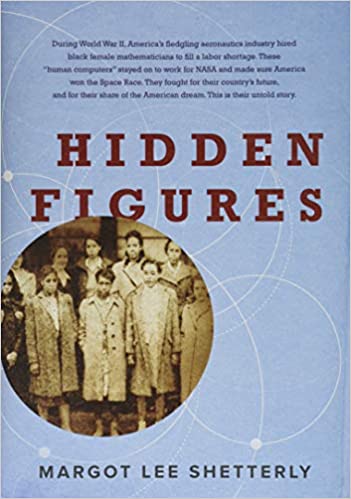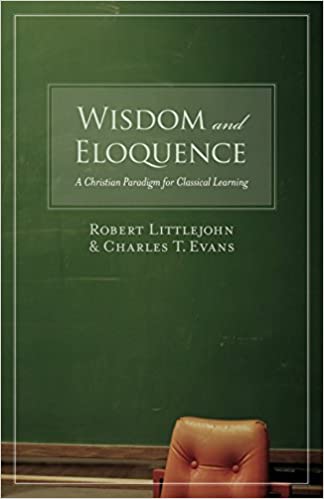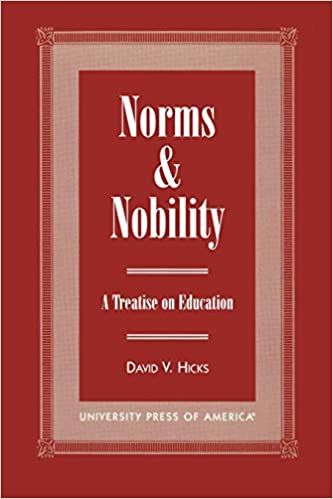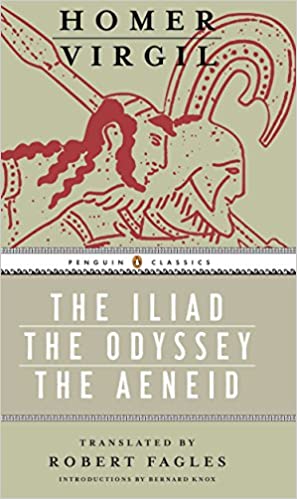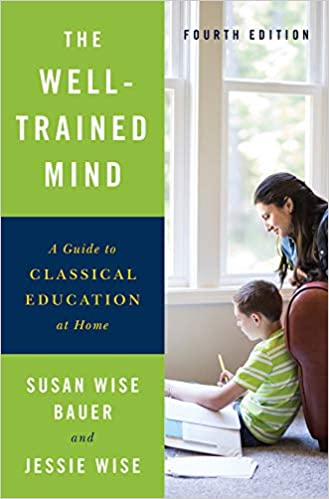Institutions of Divine and Secular Learning
As a minister of the Ostrogothic regime in the time of Theoderic, Cassiodorus had as brilliant a political career as any Roman of the late empire. Around 538 CE he published a collection of his state letters under the title of Variae (TTH 12), and disappeared from the public record. Half a century later, dying at his country estate in Calabria, he left behind the exemplars for another world of texts: that of the Christian universe of Scripture, now encompassing the Seven Liberal Arts.
More info →The Great Tradition: Classic Readings on What It Means to Be an Educated Human Being
Frustrated with the continuing educational crisis of our time, concerned parents, teachers, and students sense that true reform requires more than innovative classroom technology, standardized tests, or skills training. An older tradition—the Great Tradition—of education in the West is waiting to be heard. Since antiquity, the Great Tradition has defined education first and foremost as the hard work of rightly ordering the human soul, helping it to love what it ought to love, and helping it to know itself and its maker. In the classical and Christian tradition, the formation of the soul in wisdom, virtue, and eloquence took precedence over all else, including instrumental training aimed at the inculcation of "useful" knowledge.
Edited by historian Richard Gamble, this anthology reconstructs a centuries-long conversation about the goals, conditions, and ultimate value of true education. Spanning more than two millennia, from the ancient Greeks to contemporary writers, it includes substantial excerpts from more than sixty seminal writings on education. Represented here are the wisdom and insight of such figures as Xenophon, Plato, Aristotle, Seneca, Cicero, Basil, Augustine, Hugh of St. Victor, Bonaventure, Thomas Aquinas, Martin Luther, John Calvin, Erasmus, Edmund Burke, John Henry Newman, Thomas Arnold, Albert Jay Nock, Dorothy Sayers, C. S. Lewis, and Eric Voegelin.
More info →The Didascalicon of Hugh of Saint Victor: A Guide to the Arts
The Liberal Arts Tradition: A Philosophy of Christian Classical Education (Revised Edition)
The Liberal Arts Tradition: A Philosophy of Christian Classical Education introduces readers to a paradigm for understanding a classical education that transcends the familiar 3-stage pattern of grammar, logic, and rhetoric. Instead, this book describes the liberal arts as a central part of a larger and more robust paradigm of classical education that should consist of piety, gymnastic, music, liberal arts, philosophy, and theology. The Liberal Arts Tradition also recovers the means by which classical educators developed more than just intellectual virtue (by means of the 7 liberal arts) but holistically cultivated the mind, body, will, and affections. This is a must-read for educators who want to take a second big step toward recovering the tradition of classical education.
More info →Beauty in the Word: Rethinking the Foundations of Education
What is a good education? What is it for? To answer these questions, Stratford Caldecott shines a fresh light on the three arts of language, in a marvelous recasting of the Trivium whereby Grammar, Dialectic, and Rhetoric are explored as Remembering, Thinking, and Communicating. These are the foundational steps every student must take towards conversion of heart and mind, so that a Catholic Faith can be lived out in unabashed pursuit of the True, the Good, and the Beautiful. Beauty in the Word is a unique contribution to bringing these bountiful aspects of the Real back to the center of learning, where they rightfully belong. If your concern is for the true meaning of education for your children, here is the place to begin.
More info →Hidden Figures: The American Dream and the Untold Story of the Black Women Mathematicians Who Helped Win the Space Race
The phenomenal true story of the black female mathematicians at NASA at the leading edge of the feminist and civil rights movement, whose calculations helped fuel some of America’s greatest achievements in space—a powerful, revelatory contribution that is as essential to our understanding of race, discrimination, and achievement in modern America as Between the World and Me and The Immortal Life of Henrietta Lacks. The basis for the smash Academy Award-nominated film starring Taraji P. Henson, Octavia Spencer, Janelle Monae, Kirsten Dunst, and Kevin Costner.
Before John Glenn orbited the earth, or Neil Armstrong walked on the moon, a group of dedicated female mathematicians known as “human computers” used pencils, slide rules and adding machines to calculate the numbers that would launch rockets, and astronauts, into space.
Among these problem-solvers were a group of exceptionally talented African American women, some of the brightest minds of their generation. Originally relegated to teaching math in the South’s segregated public schools, they were called into service during the labor shortages of World War II, when America’s aeronautics industry was in dire need of anyone who had the right stuff. Suddenly, these overlooked math whizzes had a shot at jobs worthy of their skills, and they answered Uncle Sam’s call, moving to Hampton, Virginia and the fascinating, high-energy world of the Langley Memorial Aeronautical Laboratory.
Even as Virginia’s Jim Crow laws required them to be segregated from their white counterparts, the women of Langley’s all-black “West Computing” group helped America achieve one of the things it desired most: a decisive victory over the Soviet Union in the Cold War, and complete domination of the heavens.
Starting in World War II and moving through to the Cold War, the Civil Rights Movement and the Space Race, Hidden Figures follows the interwoven accounts of Dorothy Vaughan, Mary Jackson, Katherine Johnson and Christine Darden, four African American women who participated in some of NASA’s greatest successes. It chronicles their careers over nearly three decades they faced challenges, forged alliances and used their intellect to change their own lives, and their country’s future.
More info →Middlemarch
Middlemarch is a complex tale of idealism, disillusion, profligacy, loyalty and frustrated love. This penetrating analysis of the life of an English provincial town during the time of social unrest prior to the Reform Bill of 1832 is told through the lives of Dorothea Brooke and Dr Tertius Lydgate and includes a host of other paradigm characters who illuminate the condition of English life in the mid-nineteenth century.
More info →Wisdom and Eloquence: A Christian Paradigm for Classical Learning
To succeed in the world today, students need an education that equips them to recognize current trends, to be creative and flexible to respond to changing circumstances, to demonstrate sound judgment to work for society's good, and to gain the ability to communicate persuasively.
More info →Norms and Nobility: A Treatise on Education
A reissue of a classic text, Norms and Nobility is a provocative reappraisal of classical education that offers a workable program for contemporary school reform. David Hicks contends that the classical tradition promotes a spirit of inquiry that is concerned with the development of style and conscience, which makes it an effective and meaningful form of education. Dismissing notions that classical education is elitist and irrelevant, Hicks argues that the classical tradition can meet the needs of our increasingly technological society as well as serve as a feasible model for mass education.
More info →The Iliad, The Odyssey, and The Aeneid
ONE OF THE PREEMINENT translators of our time, Robert Fagles’s interpretations of these epic poems give new life to three seminal works in the Western canon. The Penguin Classic Deluxe Editions of The Iliad, The Odyssey, and The Aeneid are collected here for the first time in a specially designed gift box. Each volume contains a superb introduction by renowned classicist Bernard Knox.
More info →The Well-Trained Mind: A Guide to Classical Education at Home
From Amazon:
"The Well-Trained Mind will instruct you, step by step, on how to give your child an academically rigorous, comprehensive education from preschool through high school―one that will train him or her to read, to think, to understand, to be well-rounded and curious about learning. Veteran home educators Susan Wise Bauer and Jessie Wise outline the classical pattern of education called the trivium, which organizes learning around the maturing capacity of the child’s mind and comprises three stages: the elementary school “grammar stage,” when the building blocks of information are absorbed through memorization and rules; the middle school “logic stage,” in which the student begins to think more analytically; and the high-school “rhetoric stage,” where the student learns to write and speak with force and originality. Using this theory as your model, you’ll be able to instruct your child―whether full-time or as a supplement to classroom education―in all levels of reading, writing, history, geography, mathematics, science, foreign languages, rhetoric, logic, art, and music, regardless of your own aptitude in those subjects."
More info →
